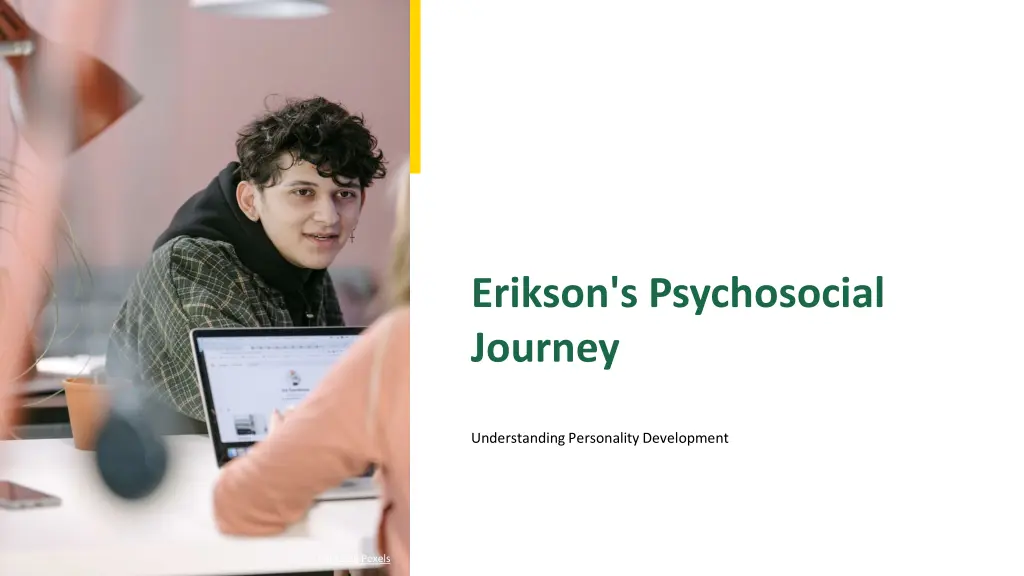
Erikson's Psychosocial Journey: Understanding Personality Development
Explore Erikson's psychosocial journey through different life stages unraveling key conflicts like trust vs. mistrust and autonomy vs. shame. Discover how resolving these conflicts shapes personality development and social interactions, leading to a deeper understanding of ourselves and others.
Download Presentation

Please find below an Image/Link to download the presentation.
The content on the website is provided AS IS for your information and personal use only. It may not be sold, licensed, or shared on other websites without obtaining consent from the author. If you encounter any issues during the download, it is possible that the publisher has removed the file from their server.
You are allowed to download the files provided on this website for personal or commercial use, subject to the condition that they are used lawfully. All files are the property of their respective owners.
The content on the website is provided AS IS for your information and personal use only. It may not be sold, licensed, or shared on other websites without obtaining consent from the author.
E N D
Presentation Transcript
Erikson's Psychosocial Journey Understanding Personality Development Photo by Pexels
01 The Essence of Erikson Table of Contents 02 Life Stages Unraveled 03 Trust vs. Mistrust 04 Autonomy vs. Shame 05 The Conflict Concept 06 Virtue of Hope 07 Consequences of Imbalance 08 The Power of Autonomy 09 Psychosocial Strengths 10 Erikson's Legacy 11 Thank You!
1 The Essence of Erikson Pioneer of Psychology Erik Erikson, known as the Father of Psychosocial analysis , revolutionized our understanding of personality development. He redefined Freud s theories, placing emphasis on the emotional and social aspects of growth throughoutlife stages. Through his work, he illuminated the importance of resolving core conflicts during our journey from infancy to maturity. Erikson s insights offer pathways to understanding ourselves and the people around us, enhancing our social interactions. Photo by Pexels
2 Life Stages Unraveled The Developmental Ladder Erikson proposed that each life stage presents unique conflicts essential for personal growth. From trust to integrity, successfully navigating these conflicts leads to a healthypersonality across the lifespan. These stages include trust vs. mistrust, autonomy vs. shame, and more, guiding our emotional and social development. Understanding this framework helps us grasp human behavior, fostering empathy and growth in ourselves and others. Photo by Pexels
3 Trust vs. Mistrust Stage 1 Explained In the first stage, from birth to 18 months, babies must develop trust throughreliable caregiving. Parental love, warmth, and physical care enable children to feel secure and develop hope. Inconsistent care leads to mistrust, impacting future relationships and emotional well-being. Trust forms the foundation for healthy development and will guide us throughlater challenges. Photo by Pexels
4 Autonomy vs. Shame Stage 2 Insights From 18 months to 3 years, children strive for autonomy, learning to do things independently. Success in this stage fosters confidence; failure may lead to feelings of shame and doubt about their abilities. Encouragement and support from caregivers are essential to navigate this critical phase successfully. Legitimate autonomy nourishes self-esteem, shaping resilient individuals ready to face future challenges. Photo by Pexels
5 The Conflict Concept A Turning Point Erikson introduced conflict as a pivotal moment within each stage of personality development. This struggle can either empower individuals or lead to vulnerabilities affecting their lives. These turning points represent opportunities for growth and transformation if navigated positively. Recognizing these conflicts reveals insights into personal experiences and interpersonal dynamics. Photo by Pexels
6 Virtue of Hope A Reward for Trust In the Trust vs. Mistrust stage, when care is balanced, children gain the virtue of hope . This sense of hope enables openness to experiences, coupled with a cautious understanding of potential dangers. Hope acts as a catalyst for resilience, guiding individuals throughlife's challenges. Cultivating hope is essential for mental health and personal growth, benefiting future relationships. Photo by Pexels
7 Consequences of Imbalance The Risks An imbalance during Trust vs. Mistrust may lead to maladaptive behaviors like gullibility or withdrawal. Those affected might experience depression, paranoia, or issues in future relationships. Recognizing these maladaptive tendencies highlights the importance of nurturingtrust from early on. Understanding these risks empowers caregivers to create supportive environments for children. Photo by Pexels
8 The Power of Autonomy Stage 2 Outcomes Fostering autonomy in children paves the way for independence and self-confidence. Shame and doubt can emerge if caregivers undermine attempts at independence, impacting the child's self-image. Successful management of this stage influences later stages, including initiative and identity. Supporting autonomy cultivates strong, capable individuals ready for life's challenges. Photo by Pexels
9 Psychosocial Strengths Building Resilience Each successfully navigated stage gifts individuals with virtues, reinforcing psychological strengths. These strengths serve as tools that aid in overcoming future challenges and conflicts. Through Erikson s lens, we learn that personal growth is a lifelong journey based on earlier experiences. Cultivating these strengths enhances our capacity for empathy, connection, and resilience in communities. Photo by Pexels
10 Erikson's Legacy Impact on Psychology Erikson's psychosocial development theory profoundly influences modern psychology, education, and counseling. His emphasis on social dimensions reshaped how we understandchildhood, learning,and identity development. His theories encourage lifelong learning, adaptability, and empathy across various domains of life. Erikson's insights remain a vital part of therapeutic practices and educational frameworks today. Photo by Pexels
11 Thank You! Wrap Up Thank you for exploring Erikson s Psychosocial Development Theory with us today! Understanding these stages can empower us in personal growth and enriching our relationships. May we apply these insights in our daily lives to foster emotional well-being. Together, let s continue the journey of self-discovery and connection! Photo by Pexels
